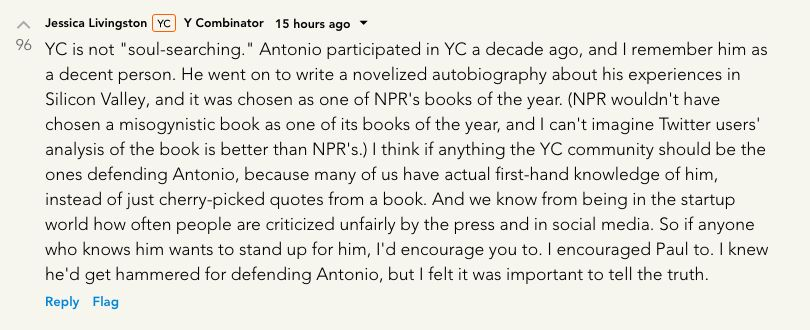#4 Jack's Weekly Digest: I want the fucking $$$, I will drop out of Oxford (?!), and Hail Hydra
Plus: getting kicked out Y-Combinator, Unbundling Higher Education, and how Apple copied WeChat.

Expectation: you receive an issue of my Weekly Digest every Sunday
Reality: you only receive it on a Tuesday (not even Monday, as of last time).
For my new subsribers, welcome!
In case you do not know it yet, the structure of this newsletter is as follows:
- Weekly issue delivered to your mailbox every Sunday
- 10 Reads of the Week
- My analyses and suggestions for further readings
- Jokes of the Week
- (if any) Links to my new blog posts
Do you find these interesting? Sign up here to subscribe. You will also receive a weekly update of this newsletter alongside occasional blog updates.
Lastly, I am seeking sponsorships/grants to support my blog. Specifically, I write about quirky science, trendy thoughts and hidden connections.
Some examples of my drafts:
- The under-lit segment of anti-Enlightenment history
- Shorting startups in the 2021 bull market
- Why I, as a Chinese, learnt Arabic in Jordan
- Silicon Valley's intellectual obsession with German philosophers
- Programmable biology: what is the AWS of biotech?
- Many more....in fact... 90 other drafts more!
I spent a significant amount of time on research, developing a provocative thesis and framing my content in a way that is refreshing and novel for readers. In other words, I guarantee that you cannot find similar content elsewhere on the Internet.
This is why support from my readers is so important, especially given that this type of content is heavily intellectual and it is not at all commercial.
If you know of any grants/sponsorships, please reach out to me. You can also learn more about me here
1- I want the fucking money and I will get it

Chamath Palihapitiya is the embodiment of contradictions:
Venture capitalists are “a bunch of soulless cowards.”
Of hedge-fund managers: “Let them get wiped out. Who cares? They don’t get to summer in the Hamptons? Who cares?”
(He made both proclamations after he had become a venture capitalist and started a hedge fund; he has yachted off the Italian coast.)
Greed is good and we all think it is good?
Palihapitiya promotes the spac as an innovation that “democratizes access to high-growth companies” while “dismantling” the “traditional capital market.” But he has sometimes acknowledged a simpler allegiance. “I want the fucking money,” he told students at Stanford’s business school, in 2017. “I will play the goddam game, and I will win.”
Kings often need an origin story:
In high school, Palihapitiya began calling managers who had signed the rejection notes, suggesting that they reward his youthful determination by giving him a summer job. Newbridge Networks hired Palihapitiya to work on its I.T. help desk, where he bet his manager a fast-food lunch that he’d clear six thousand trouble tickets before school resumed. By August, Palihapitiya told me recently, he had “crushed all the trouble tickets.” He went on, “The guy took me to McDonald’s and I ate seven Big Macs. It was crazy.”
SPAC is not merely a bubble. It will stay for a while. Why? First look at a history of other 'bubbles':
After the First World War, a group of speculators promised easy stock-market profits through a new fad: the mutual fund. An advertisement from the nineteen-twenties described them as “one investment that is never too high to buy.” In the late fifties, bankers began mailing out a fresh invention—the credit card—with tales of checkout-aisle convenience, envy-inspiring sophistication, and even women’s liberation. “A wife deserves some credit—her own Barclaycard,” one ad declared. In the eighties, after years of stagflation, headlines began appearing about an audacious young financier named Michael Milken who was hawking “junk bonds” to help corporate raiders. Milken would have his firm prepare letters claiming he was “highly confident” that he could sell enough junk bonds for raiders to take over the companies they wished to acquire. The letters, which were often publicized, were so persuasive that targeted companies commonly surrendered.
And now? Mutual fund is the norm. Credit card is everywhere. Junk bonds are basically compulsory for any buyouts. CDOs are the standard for underwriting mortgages.
Today, mutual funds are among the safest and most popular investments. Credit cards are part of most Americans’ daily lives. Junk bonds have become a crucial tool of corporate finance, a $1.2-trillion marketplace used by tens of thousands of companies to build new factories and hire new workers. (Milken ended up serving less than two years, and today he is worth $3.7 billion.) Although the implosion of Mozilo’s Countrywide Financial helped hobble the international economy, hundreds of thousands of homeowners still get loans each year thanks to collateralized-debt obligations and subprime mortgages.
We worship public figures with split personalities. Is that natural? Is this a twisted norm?
Even Palihapitiya’s friends admit to being confused by some of his actions. “There’s this self-destructive piece of him that seems bound up in what he does so well,” one of them told me. Many of his public confrontations come across as juvenile. Recently, someone tweeted that he was not excited about seeing Palihapitiya speak at a forthcoming cryptocurrency conference. Palihapitiya tweeted back, “You’re a joke,” followed by “I owned Bitcoin when you were still living in Mommy’s basement.” He cancelled the appearance. His friend told me, “It’s like he can’t stop from going dark sometimes.” Palihapitiya is not alone in this regard: Elon Musk, Donald Trump, and others who have profited from adopting bellicose stances online clearly have trouble knowing when to stop.
Weirdly so, there is an appeal for people with split personalities. To be honest, while he is not a builder - a founder creating value - his power to shape narratives is admirable.
On the other hand, is there first-mover advantage in financial innovation? More specifically, Bank of America invented credit card. Did BoA capture most of the value? Similarly, Michael Milken 'invented' junk bond. But the private equity industry piggy-backed off his invention and created much more wealth than he did e,g, founders of Blackstone, Apollo, and KKR etc.
Perhaps it is better to go second, than first, in a new competition.
2 - I got kicked out
lol just got kicked out of @ycombinator
— Paul Biggar (@paulbiggar) June 4, 2021
It is what it looks like. How did Biggar got kicked out? For the following tweet:
For the second time, a @ycombinator founder has posted to the internal YC forum about how they lied to skip the vaccine queue in Oakland, with instructions for other founders to do the same.
— Paul Biggar (@paulbiggar) March 11, 2021
Absolutely fucking disgusted
Biggar also criticized YC for its lack of commitment on diversity. It also turns out that there was another founder who got kicked out too.
I want to draw attention to another founder, @ekadamer, who was also kicked out of @ycombinator, but this time for calling out YC's misogyny. Thread ⬇️
— Paul Biggar (@paulbiggar) June 5, 2021
And it started with a discussion on Antonio Garcia Martinez (AGM)'s book, Chaos Monkey. Below is a controversial quote from the book:

And the book has actually good very decent reviews on Amazon.
Jessica (a female YC partner)'s comment also did not help with the situation:

I guess debates like this either 1) mobilize people to counter YC 2) or further alienate people from caring about these issues. In political science, we call these issues 'cleavages'. Whether or not these cleavages are activated upon depends on political agents. For some, these cleavages might be salient (important); for others, not so much.
3 - Unbundling Higher Education
Think about higher education as a product. What really are universities selling to students? They are selling:
- academic knowledge/vocational training
- the 'college experience'
- a network of schoolmates and alumni
- credentials i.e. a diploma for completing a degree
However, as all Jacks of All Trade, universities are failing. It is very difficult to be equally good at developing four products at once. Think about the University of Oxford, where I study at now.
- Oxford is known to be the Ivory Tower. This image has slowly faded as the teaching quality gradually diminished over the years. For vocational training, Oxford teaches you nothing useful in real life. And we are well-known for that.
- The Oxford experience is pretty much intact - going to college formals, clubbing, and punting. Bonus: getting mentioned on Oxfess
- The Network is useful in professional careers i.e. banking, consulting, law and civil service. Outside of that, Oxford is at least 10x lagging behind its counterparts e.g. Stanford, Harvard and MIT. (are they even fair comps to Oxford? :p )
- Does the Oxford degree matter? It mattered a lot 10 years ago. Now, the appeal has faded away. While it still indicates that you are roughly top 1% in academic prowess, it does not indicate if you are top 1% in general intelligence. Worse, we have the Harvards in the United States that can really indicate the top 0.1% with their staggeringly low admission rate and concentrated population of the wealthy elites.
The Silicon Valley approach to challenge incumbents is to bundle and unbundle. In the past, we had to rent DVDs one by one. Now, we watch 10,000+ of shows on Netflix on-demand. In the past, we had to pay individually for each business software we used. Now, we pay a lump-sum fee to use a suite of Microsoft Office products indefinitely.
This approach is so entrenched and influential – the Tech World even believes that 'the only way to make money is by bundling and unbundling.
One of the challengers that want to unbundle higher education is On Deck, which tries to build a tight knit community with the ambition of building the Harvard of the digital-native 21st century.
Will On Deck succeed? What is the general state of higher education? These questions are simply beyond the scope of this newsletter. What I recommend, instead, is to listen to this podcast hosted by the founder of On Deck. He talks very succinctly diagnosing the problem and explaining where On Deck comes in as a better solution.
Erik, the founder, often tweets out thought-provoking content. Here's one that got me thinking a lot:
Places like Harvard have great networks.
— Erik Torenberg (@eriktorenberg) September 26, 2018
So why don't more ppl (as in, 5x more than now (~20ppl?)) get into Harvard for semester, drop out, + just live near campus+make friends but not pay the $250k to be enrolled?
Takes creativity, but doable. Imagine the network w/o the debt? https://t.co/3JSQjoSJfn
The value of Harvard/Oxford has diminished greatly. For some ambitious young people, the value of Harvard is just its 'curation' value – or in economics, we call that a 'signal'. A Harvard offer is a signal to the world that you have passed Harvard's selection test.
Let me take this thought further. Rather than actually doing the Y-Combinator program, why not deliberately do something smart that gets you kicked out of YC?
Or even better, reject YC's offer and not do it at all. I think I have come across founders who have done this. I am not sure if how well they are doing now.
However, there is one caveat: you cannot replicate in-person network building within campus ecosystems. There are certain things that you can do once you are in Oxford physically: meeting strangers who sit next to you in formal halls, first get-withs at Bridge (a club in Oxford) and getting wasted at President's Drinks, a type of free-flow drinks event hosted by career-focused student societies.
You just cannot replicate elitism.
I am writing up a blog combining my lessons learnt selling AI software to higher education clients with my personal experience as a consumer (student) of higher education. Talk to me if you are interested to learn more.
Disclaimer: I was accepted to join the first cohort of On Deck's Catalyst (ODC) fellowship program. I have deferred to the second cohort in September 2021. My views above might be biased.
4 - Hail Hydra
There are two reasons why I find Hydra, Hydra vulgaris, fascinating.
The first reason is that Hydra has a super-regenerative power.
Hydra is basically biologically immortal. It is full of stem cells that can divide perfectly and indefinitely – a trait of non-senescence.
Researchers genetically engineered the cells of Hydra so that the exterior cells give off purple colour while the interior ones give off green colour.

They then chopped the Hydra off, in an attempt to 'mix' these cells together. A few days later, the cells figured themselves out and started differentiating again.

This is an experiment with infinite possibilities. These Hydra cells are literally LEGO blocks. There is so much we can play around with them. Can we genetically engineer them so that cell division occurs at a faster rate? Can we add in other types of cells and see how Hydra cells interact?
We need to make this a toy.
The second reason why I find Hydra fascinating is that it also needs to sleep. This challenges the notion that sleep is brain-centric.
Researchers have noticed that molecules produced by muscles and some other tissues outside the nervous system can regulate sleep. Sleep affects metabolism pervasively in the body, suggesting that its influence is not exclusively neurological. And a body of work that’s been growing quietly but consistently for decades has shown that simple organisms with less and less brain spend significant time doing something that looks a lot like sleep
An even deeper question:
“If you really want to push the envelope, do animals that do not have neurons at all sleep?” Raizen asked.
Lastly, I cannot resist the temptation to end this section with an Avengers meme:

5 - Apple copies WeChat - wait, say that again?
Apple applets are really nice payment flow. Credit cards are doomed. pic.twitter.com/3fl6zGsoU7
— Paul McKellar 🦁 (@pm) May 31, 2021
Scan a QR code, pay by Apple Pay, and vóila! If this flow sounds very much like WeChat, that's because it basically is the core of WeChat: scanning QR codes.
I have two thoughts on this. First, why does the West adopt QR-code so slowly? My hypothesis is that the West does not have an urgency to do so. The Internet and mobile infrastructure is more developed. On the other hand, China is playing the catch-up game. However, on a second thought, the reality is much more nuanced. Five years ago, the % of mobile Internet coverage in China probably is not that far behind of United States', or Europe's – bearing in mind that the West also has a wide range of rural areas that are historically difficult for Internet infrastructure to reach.
Second, what is the future of Apple Pay? Does Apple want to eat Square at Point of Sale, and Stripe at Internet payment? Judging from the lack of new product features coming out of Apple Pay, I suspect the answer is no. Apple is very comfortable sitting on top of all payment stack. It collects rent, in the form of payment data, simply because they own Apple Pay users. Everyone who uses Apple Pay has to go through Apple. There is absolutely no way around it.
What I am Reading

- when life gives you Uranium, you make Oxygen

- Games are eating Chinese consumer tech
- Why? Because you need to own users' attention

- Rise of Cathie Wood is inevitable in each wave of bubble and innovation
- The best performing managers then become the worst in the next decade
- Running a fund is a principal-agent problem: the manager and the fund both win from upside; only the fund loses from downside
Joke of the Week
Does Windows even hire designers?
I am taking a break....
...and focus on writing up a few blogs.
This is the #4 issue of Jack's Weekly Digest, which also means I have spent a month on it now.
If you want to read the previous issues (which I strongly recommend), come here:

I might occasionally update my newsletter but I will focus on writing up more coherent and laid-out thoughts on a few reads, rather than ticking the boxes of '10 Reads of the Week'.
Like this? Sign up here



